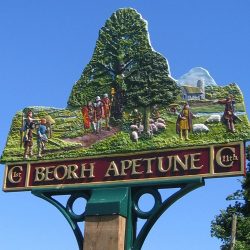Edward Davey
EDWARD WILLIAM DAVEY
4691, Private
6th (Inniskillings) Dragoons
Who died aged 34 on 26th December 1916
Buried in St Riquier British Cemetery, France
Family Background
When Edward Davey enlisted in 1901 he specified Bergh Apton as his residence. We have no information on where he lived but we know that he was born in Alpington.
We have little information about him other than on his enlistment papers, and a possibility that he was related to the Davey family recorded on the 1901 Census living at Prospect Place in Bergh Apton.
Military Service
Edward Davey, a long-service Cavalryman, enlisted in the army on 2nd December 1901. His Regiment has the interesting distinction of being that in which Captain Oates served, who died in the Antarctic with Captain Falcon Scott in their unsuccessful 1912 attempt to be first to the South Pole.
Davy is recorded as having died “of burning” without specify the cause. His Army Effects Record adds the word “accidental” to the cause of death. There was no record of fighting at the time of his death (was there, perhaps, an understanding on both sides about it being the Christmas season?) so the probability is high that he died as the result of mishap rather than in active warfare.
He was buried in the Fressenville Military Cemetery but his body and those of the other 29 British soldiers in Fresenville were mpved to the small British military section of the communal cemetery of St Riquier, to the north of Rouen.
More Family Background
In his Will, in his Army records, he nominated Mrs Marion Weeding as his sole heir. We are confident that Mrs Weeding is one and the same person as Marion Clare with whose family Davy was living at the time of the 1891 Census and who married Frederick Weeding in 1904.
We think, further, that Marion’s father Henry Clare was the brother of Isaac Clare (with whom Davy was staying in Overstrand at the time of the 1901 Cenus, and of Davy’s mother.
Thus Marion Clare and Edward Davy were almost certainly first cousins and that accounts for his decision to leave his worldly goods, such as they were, to her.
Test Post
askdhsldfkjcblkj
